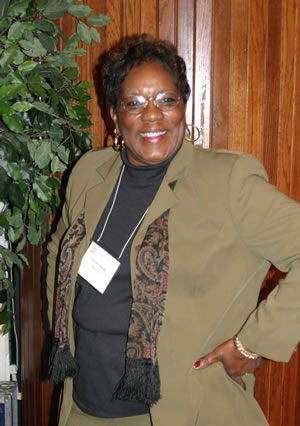Carrie Thomas
A pickup truck delivered the tattered, scribbled books without covers after they’d been discarded by the white children in the school down the road. Carrie Thomas learned to read from those books. That was 1954.
Carrie and her 12 siblings worked in the cotton fields with their sharecropper father, certain that things were going to get better with integration. When word spread that one brave black child had tried out the brand-new public swimming pool, dozens rushed to follow. They found the pool filled with trash. So it remains to this day. While the nearby city of Albany, Georgia, grew and prospered, blacks in Carrie’s small, sleepy town of Smithville remained under the thumb of an all-white power structure. The years passed and nothing seemed to change. Carrie married a man who became abusive, but with six children she saw no alternative but to stick it out
In the ’90s, the Smithville police department was out of control. Rogue cops patrolling the U.S. highway that winds through the town routinely pulled blacks out of their cars and arrested bystanders for obstruction. The white municipal court judge meted out harsh sentences to defendants who were denied counsel.
Late in the summer of 1999, Carrie and her girlfriends hosted John Cole Vodicka, who had just received a Petra award and was leading a walk through southwest Georgia to call attention to criminal justice abuses. Carrie listened quietly to the stories and remembers feeling “pumped up and inspired to work for change.” Her chance came right after lunch. As the small group of civil rights marchers stepped past the “Welcome to Smithville” sign, the chief of police blocked their way and told them they could not parade without a permit. Carrie found her voice. “Well, Chief,” she said, “this is our town and our freedom walk, so you’ll just have to arrest us.”
The jailing, trial and exoneration of the “Chicken Pie Six” proved to be pivotal for Carrie and Smithville. With the help of John Cole Vodicka’s Prison & Jail Project, Carrie founded the Smithville Freedom Center. Originally run out of a trailer, the center celebrated its expansion into a downtown building donated earlier this year.
Starting by addressing the needs of the black schoolchildren who are often targeted for excessive discipline or steered into special ed classes, the center launched early reading readiness, after-school and summer school programs. The Freedom Center helped elect an all-black city council. Police officers with records of brutality and ties to the Ku Klux Klan were sacked, a white chief was forced out of office for drinking confiscated alcohol and viewing pornography while on duty and the municipal court caseload dropped from an average of 100 hearings a month to five. For the past two years, dozens of women have met regularly at the Freedom Center to plot their next moves, which now include outreach to the town’s seniors and the creation of a library of African-American children’s literature.
Carrie vividly remembers her own turning point: “I was just plain fed up. Someone had to speak up, why not me? Now I am another person and I am blessed knowing that our kids won’t grow up being harassed, they will have beautiful new books to read and a pool – and they will learn to swim.”
 Photo by Dorothea von Haeften
Photo by Dorothea von Haeften